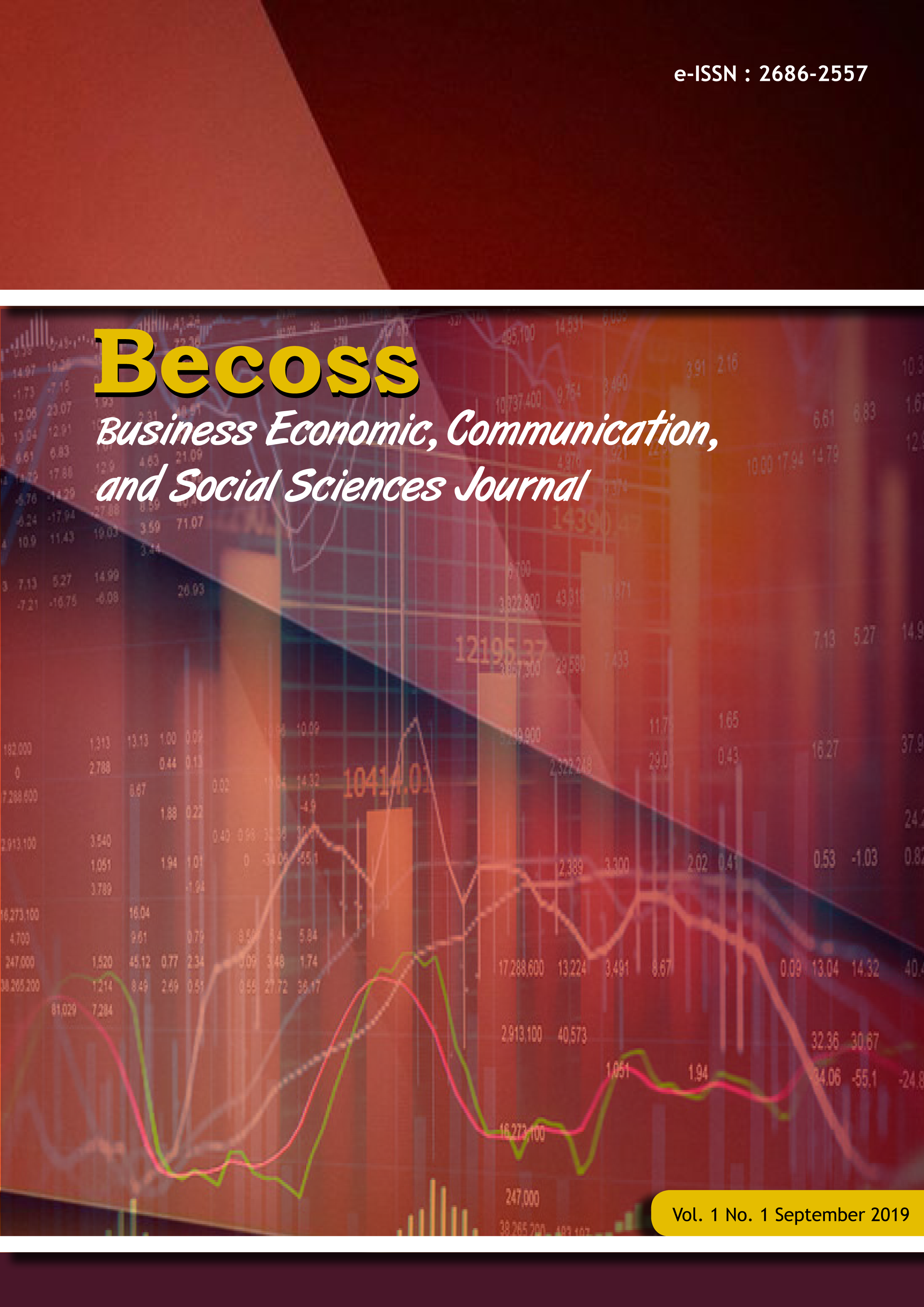PERLINDUNGAN HUKUM DATA PRIBADI DI INDONESIA
DOI:
https://doi.org/10.21512/becossjournal.v1i1.6030Keywords:
Privasi, data pribadi, perlindungan hukumAbstract
Attention to the protection of personal data increases with the development of technology, information and communication (ICT). Collecting, managing and storing personal data is increasingly easy to do by using the technology. These conditions are vulnerable to individual privacy. Privacy is recognized as a human right that required s a legal protection of personal data. As a legal state, Indonesia provides legal protection of human rights as stated firmly on UUD 1945. On the other hand, Indonesia is open to utilization of information and communication technology, including the internet. As consequences, Indonesia has to ensure that data protection has been covered by law. Therefore, using a normative juridical research method, this paper seeks to describe legal protection for personal data in Indonesia today. It shows that legal protection of personal data only accommodated on sectoral regulation that acquired a specific comprehensive act.
References
Asosiasi Jasa Penyelenggara Internet Indonesia, A. (2018). Laporan Survei Penetrasi & Profil Perilaku Pengguna Internet Indonesia. APJI.
Cate, F. H. (2000). Principles of Internet Privacy. Connecticut Law Review, 32(3), 877–896.
Dammann, O. (2018). Data, Information, Evidence, and Knowledge: A Proposal for Health Informatics and Data Science. Online Journal of Public Health Informatics, 10(3). https://doi.org/10.5210/ojphi.v10i3.9631
Djafar, W. (2017). Big data dan pengumpulan data skala besar di Indonesia:Pengantar untuk memahami tantangan aktual perlindungan hak atas privasi (Internet dan Hak Asasi Manusia). Jakarta.
Djafar Wahyudi, Sumigar Bernhard Ruben Fritz, S. B. L. (2016). Protection of personal data in Indonesia. Jakarta. Retrieved from http://weekly.cnbnews.com/news/article.html?no=124000
Economist, T. (2017). The worlds most valuable resource is no longer oil but data. Retrieved from https://www.economist.com/leaders/2017/05/06/the-worlds-most-valuable-resource-is-no-longer-oil-but-dataGDPR. Directive 95/46/EC General Data Protection Regulation (2016).
Geistiar Yoga Pratama*, S. A. (2016). Perlindungan Hukum Terhadap Data Pribadi Pengguna Jasa Transportasi Online Dari Tindakan Penyalahgunaan Pihak Penyedia Jasa Berdasarkan Undang-Undang Nomor 8 Tahun 1999 Tentang Perlindungan Konsumen, 5(3), 1–19.
Holvast, J. (2008). History of Privacy *. In The Future of Identity in the information society (pp. 13–42). IFIP Advances in Information and Communication Technology.
Indriyani, M., Andaria, N., Sari, K., P, S. U. W., Hukum, F., Airlangga,
U., & Surabaya, K. (2017). Perlindungan Privasi dan Data Pribadi Konsumen Daring Pada Online Marketplace System. Justitia Jurnal Hukum, 1(2), 191–208.
Kang, J. (2006). Information Privacy in Cyberspace Transactions. Stanford Law Review, 50(4), 1193–1293. https://doi.org/10.2307/1229286
Kumparan. (2017). Kisah “Teror Cinta” Driver Ojek Online pada Sang Penumpang. Kumparan. Retrieved from
https://kumparan.com/@kumparannews/kisah-teror-cinta-driver-ojek-online-pada-sang-penumpang
Kusniati Retno. (2011). Sejarah Perlindungan Hak Hak Asasi Manusia Dalam Kaitannya Dengan Konsepsi Negara
Hukum. Inovatif Jurnal Hukum, 4(5), 79–91. https://doi.org/10.1093/oxfordhb/9780199578610.013.0012
Lukacs, A. (2017). What Is Privacy? The history and definition of privacy. University of Szeged, 256–265. https://
doi.org/3188699
Makarim, E. (2003). Kompilasi hukum telematika. Jakarta: Raja Grafindo Perkasa.
Makarim, E. (2014). KERANGKA KEBIJAKAN DAN REFORMASI HUKUM UNTUK KELANCARAN PERDAGANGAN SECARA ELEKTRONIK (E-COMMERCE) DI INDONESIA. Jurnal Hukum & Pembangunan. https://doi.org/10.21143/jhp.vol44.no3.25
OECD. (2013). The OECD Privacy Framework. https://doi.org/10.1787/5kgf09z90c31-en
Ridwan, H. (2011). Hukum Administrasi Negara. Jakarta: Raja rafindo Perkasa.
Rosadi, S. D. (2015). Cyber Law-Aspek Data Privasi Menurut Hukum Internasional,Regional dan Nasional. Refika Aditama.
Rosadi, S. D. (2017a). Implikasi Penerapan Program E-Health Dihubungkan Dengan Perlindungan Data Pribadi. Arena Hukum, 9(3), 403–420. https://doi.org/10.21776/ub.arenahukum.2016.00903.6
Rosadi, S. D. (2017b). Prinsip-Prinsip Perlindungan Data Pribadi Nasabah Kartu Kredit Menurut Ketentuan Nasional dan Implementasinya, 19(3), 206–212.
Rosadi, S. D., & Gumelar Pratama, G. (2018). Protecting Privacy On Personal Data In Digital Economic Era : Legal Framework In Indonesia. Brawijaya Law Journal, 5(2), 143–157. https://doi.org/10.21776/ub.blj.2018.005.01.09
Solove, D. J. (2002). Conceptualizing Privacy. California Law Review, 90(4), 1087–1156. https://doi.org/10.15779/Z382H8Q
Su, K., Li, J., & Fu, H. (2011). Smart city and the applications. 2011 International Conference on Electronics, Communications and Control, ICECC 2011 - Proceedings, 1028–1031. https://doi.org/10.1109/ICECC.2011.6066743
Taylor-Sakyi, K. (2016). Big Data:Understanding big data. Research Gate, 1–9.
UN. (2016). The right to privacy in the digital age. United Nations. https://doi.org/10.1017/S0020818300024796
UNCTAD. (2019). Data Protection and Privacy Legislation Worldwide. Retrieved from https://unctad.org/en/ Pages/DTL/STI_and_ICTs/ICT4D-Legislation/eCom-Data-Protection-Laws.aspx
Warren Samuel D, L. D. B. (1890). The right to privacy. Harvard Law Review, 4(5), 193–220. Retrieved from https://www.jstor.org/stable/1321160
Downloads
Published
How to Cite
Issue
Section
License
Authors who publish with this journal agree to the following terms:
- Authors retain copyright and grant the journal right of first publication with the work simultaneously licensed under a Creative Commons Attribution License - Share Alike that allows others to share the work with an acknowledgment of the work's authorship and initial publication in this journal.
- Authors are able to enter into separate, additional contractual arrangements for the non-exclusive distribution of the journal's published version of the work (e.g., post it to an institutional repository or publish it in a book), with an acknowledgment of its initial publication in this journal.
- Authors are permitted and encouraged to post their work online (e.g., in institutional repositories or on their website) prior to and during the submission process, as it can lead to productive exchanges, as well as earlier and greater citation of published work.
USER RIGHTS
All articles published Open Access will be immediately and permanently free for everyone to read and download. We are continuously working with our author communities to select the best choice of license options, currently being defined for this journal as follows: Creative Commons Attribution-Share Alike (CC BY-SA)






